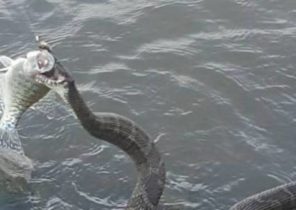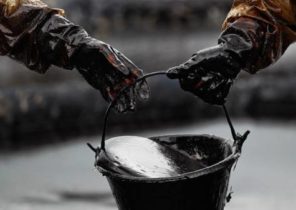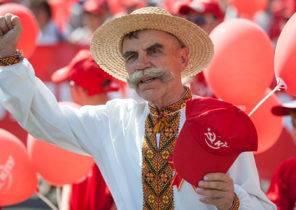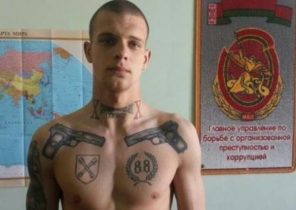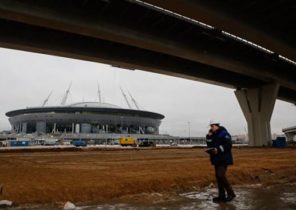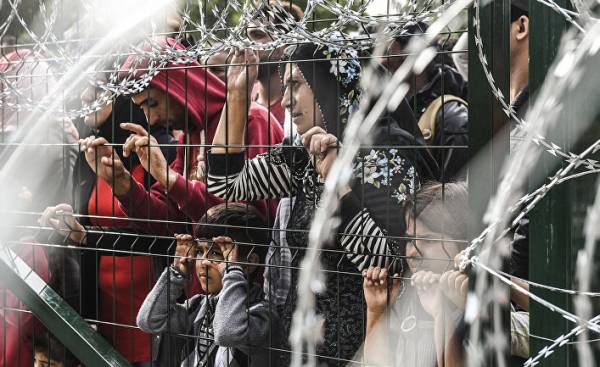
The border on the “Balkan route” was closed, but the flow of migrants in Europe has not decreased, only increased the earnings of smugglers.
Before there was the customs warehouses, now in abandoned buildings near the railway station in the centre of Belgrade, lives about a thousand people. They are stuck on the way to Europe. Hot water and heating here, recently, the volunteers brought street port-a-potties.
Afghans and a few Pakistanis. For some, there was no place in Serbian refugee camps, some did not go there for fear of deportation. In winter there were severe frosts, but they continued to live here in the smoke of fires among the trash and rats. Many retain admirable presence of mind.
“Welcome to the white house, sorry, black,” laughs 20-year-old Razi from Afghanistan. He says that he studied in Kabul computer science, but decided to go to just finally settle down in a safe place. “I thought Europe has a good heart, but I was wrong. I can understand that they don’t want to let us in, but to poison the dogs and beat on the border, as do the Hungarians?” — looks reproachfully it.
To continue his education in Europe he probably can’t, he will have to work in any shop, perhaps under the authority of compatriots. But Razi doesn’t complain, he forgot about all the ambitions and wants in the first place of tranquility. We are having a pleasant conversation. “I hope we’ll meet again,” I say. The next morning, he approached me and a friend Razi: “It’s gone now, he went “to play””.
The movement route
“Game” — so inhabitants of warehouses known attempt to cross the border illegally. Such visits, each on account of there is already a lot.
Rees says he got to Paris. Indeed, on his page in Facebook have a picture of the Eiffel tower. A year later he was deported, now European trip he will have to start almost from their original positions. Abdul tried to escape eight times. Once he even drove to Zagreb, but it launched the Croatian police. He says that before sending to Serbia, the police almost broke his nose.
His neighbor, also an Afghan from Jalalabad, have already reached Germany. Abdul happy about it, he says that the guy does not know life, he first left the house once so far. “I’m going to try next, maybe next week,” he says. Such stories here hundreds.
Although the so-called Balkan route was closed more than a year ago, on the Hungarian border has increased four-meter fence with barbed wire, and a displacement almost does not work in Belgrade as the palm shows that the migration flow is not reduced. He only went underground, including criminal.
In February 2016, Europol released a report in which it was reported that the smugglers involved in the transportation of people, earned in 2015 from three to six billion euros. Data for 2016 yet, but, apparently, their earnings rose, since after closure the demand for their services grew. According to Europol, their help uses 90% of the so-called undocumented migrants arriving in the European Union.
“In Belgrade intersect the path between the South and the North, between the EU and space that is not included”, — said the representative of the Belgrade office of the organization “Doctors without borders” Andrea Content (Andrea Contenta). In Serbia is now about 8 000 refugees from Afghanistan, Iraq and Syria. Each day they added a new one. How much exactly is hard to say. According to the office of the UN high Commissioner for refugees, during the first week of March arrived 200 people. One of them went on, is also unknown. The Hungarians imposed a limit and passed a total of 200 people in a month. It’s mostly families with children travelling further West. However to Austria through Slovenia and Croatia still gets about 2 500 people.
Smuggling methods
Ahmed, a young man with an unusual haircut is in Belgrade for a couple of months. He was born in the outskirts of Kabul. He said that in his 20s managed to zarabotatj: he collaborated with a company who brought from China computers-traveled. Ahmed lifts the shirt and shows a scarred belly. One day, when he went to Afghanistan on the bike, someone opened fire on it. Maybe a coincidence, but, maybe some enemies, he does not know. “I was writhing on the road in pain, but nobody wanted to help me, human life there is worth nothing. They say that Afghanistan is a safe country. But why would foreigners move there under guard? Who would want to live in a place like this?” he says.
Facilitator Ahmed found already in Kabul. It’s easy: each, he explains, knows someone who had already left. Passing from hand to hand, Ahmed travelled through Iran, Turkey and Bulgaria. The fugitives were a group. They received phone numbers, addresses, some people left, others were taken away. They waited in the hotel, crossing the forest. Ahmed says that in Bulgaria the smuggler put him to the breast a pistol, robbed and left in the middle of nowhere. It is difficult to say how much the whole trip, about six to seven thousand euros. Now he was stuck in Belgrade.
Ahmed says that to get to Hungary he has tried four times to no avail. The smugglers have their own methods: they know where to cut the barbed wire, what secret paths to move, they have ties in the police and border service.
Ahmed is going to try the way through Croatia. Prices rose strongly: to get from Belgrade to Italy asking € 3,500. But he already has his own “agent” as it is called here smugglers. “Can he be trusted?— muses my companion. — We say: even if the smuggler is your father, don’t trust him. But what to do, I have no other option”.
Frozen infrastructure
“When he blocked the so-called Balkan route, I thought that we will no longer, says Gordan paunović (Gordan Paunović) — member of “Infopark”. This organization came in the spring of 2015, when the migration crisis in Europe had just begun.
A group of concerned Serbs have erected in the centre of Belgrade wooden box. They gave the refugees food and clothing, provided them with information. Gordan says that during the war in the former Yugoslavia, the Serbs, too, were refugees, so they had great sympathy for the migrants. When Turkey signed an agreement with the EU, and the route was blocked off, a stream of people stopped.
“It was easy for a few days, then immediately frozen earned the entire smuggling infrastructure,” said paunović. From the next room leans out barefoot, and then the tousled head of a little girl. In the “safe space”, as they call this room, is a large family from Iraqi Mosul. They have just arrived, crossing the Serbian-Bulgarian border.
“Some days we have up to 90 people,” says George kostich (Đorđe Kostić) are on the same street organization “Nixalite”, which also was created two years ago to help the refugees. Now, when the official reception centre for migrants in Belgrade no, it gives temporary shelter to newly arrived.
Smugglers have long padded their routes here. During the war in the former Yugoslavia were supplied gasoline and other products was transferred to the West people, was carrying a weapon. The traditional way of the supply of opium from Afghanistan pass through Turkey, Bulgaria and the Western Balkans.
In 2015, it passed through and drove more than a million people. Serbia was for them a transit country, they stayed here for a couple of days. While the road to Germany remained open, for the services of smugglers, no one needed, but now they fell on a Golden age.
How to find the “agent”
“Smugglers operate flexibly, told Serbian portal SEEBiz Hrnjak Elena (Jelena Hrnjak) — a representative of the Belgrade non-governmental organization Atina, which deals with the issue of trafficking. — They take up what is beneficial in the moment: the organ trade, child pornography, drugs, weapons.” However, “no business can compete in profitability with the illegal movement and exploitation of people. Costs are low, and the demand for these “services” is growing”.
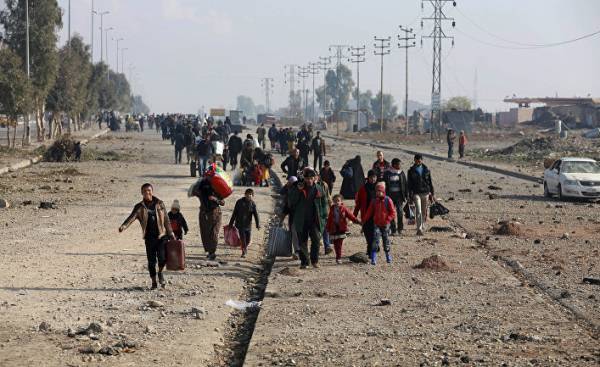 © AP Photo, Khalid MohammedИракцы fleeing from the fighting
© AP Photo, Khalid MohammedИракцы fleeing from the fighting
How to find your agent? “It’s just enough to go out in the Park,” explains Ahmed. This place in the Serbian capital is now called the “Afghan fleet”. Near the building of the economic faculty, University of Belgrade bubbling social life, in the kiosk with kebab, charge the phones, and at the same time close the negotiations and deals are made.
Smugglers can also be found via Facebook. The report Europol 2016 cited appeared in social networks announcement: “the package includes shipping from Turkey to Libya by plane and transfer to Italy by sea, the price of 3 700$. Only the sea part of $ 1,000. Three children — 500”.
Local mediators are often members of the same nationalities, that their customers. Who they are, know everything. “In Belgrade, there is one Syrian who is engaged in the transportation of people, says George kostich. We call it the “Syrian Ambassador””.
Among people who often engaged in smuggling, Europol mentions the poles. Most of them, as stated in its report, living beyond the country of origin and work drivers, carrying migrants from Eastern to Western Europe, or are in organized crime groups.
All inclusive
Smuggling networks is usually a complex multinational structure. They are the main coordinators and local implementers at different levels: agents, recruiters, drivers, organizers, people involved in forgery of documents. In the scheme of their work also appears point of bribing the authorities.
The border crossing in different ways: by means of bribes, making his way through the forests and mountains (option for physically strong), hiding in trucks. The last pattern is used less and less, because after the event, when in 2015, in Austria, found the abandoned car with 70 bodies of the suffocated migrants, the roads tightened control.
“Offers “all inclusive”, that is, when the customer pays in Kabul 10 000 euros and gets with smugglers from Afghanistan to Germany, there are less and less,” explains Gordan paunović.
In practice, migrants often overcome the individual stages of the route, collecting money for the next. Time to cross the border is becoming increasingly difficult, the prices for the services of smugglers are increasing. More recently, from Belgrade to Hungary (i.e. the EU) you can get for 150 euros, now for that require 1 500. Customers is becoming increasingly difficult to pay for the trip, and the procedure becomes more dangerous.
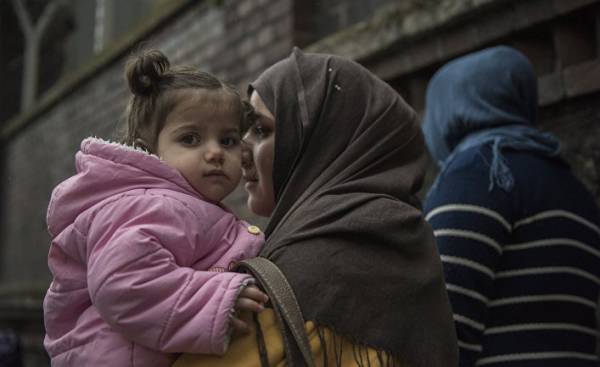 © RIA Novosti, Valery Melnikov | go to photobacteria refugees in Istanbul
© RIA Novosti, Valery Melnikov | go to photobacteria refugees in Istanbul
In a makeshift camp dinner ended, there came the van of the independent panel Hot Food Idomeni, which gives every day a thousand servings of food. Suddenly, the crowd erupts in panic. Several dozen men and boys running to the buildings. It turns out, there burst a squad of armed policemen in masks. Word of mouth broadcast the news: a smuggler keeps under lock and key a man and blackmails his family, demanding money. The police searched the building and takes a few people. No one can say what really happened. Police remains silent. Version of events is, however, quite plausible.
“Sultan” and others
Trafficking in persons is increasingly accompanied by violence. Including the fact that migrants are becoming more minor. According to the organization Save the Children, among the arrivals in Serbia migrants of 30-50%. Every fifth solo. Smugglers sometimes post pictures of Afghan children on the Internet to force their families to pay for transportation. Women and minors say that they have to pay for the journey your body. Increasingly, smugglers offer their services “on credit”: migrants work the debt off at the destination, frequently being engaged in slave labor. Of the Serbian organizations reported cases of people to pay to middlemen, sold in Lebanon kidney.
Many migrants who are stuck on some point of your journey, trying to make money by helping to smuggle others. “I came here with my uncle and cousins, says 12-year-old boy with long hair. — We help people to cross the border, yesterday we took one group to Croatia”.
Children, who are among more and more migrants, it is impossible to prosecute, therefore, explains Elena Hrnjak, they are often used as conductors.
In Serbia for unlawful transfer of people already arrested 2,000 people, but it is mostly minor performers: drivers and assistants. Remain unpunished is known important birds: “Sultan”, “Musa”, “Hasan”. “Serbia wants to get rid of the problem, so looking at their activities through their fingers,” says Gordan paunović.
Naked in the snow
Migrants who want to cross the border illegally, in danger from both the smugglers and the state officials. “In the past year, we capture the violence resorted to by the Hungarian police and border guards, — said the representative of “Doctors without borders” Andrea Content. — For the first two months of 2017 to our clinic got 60 people who were beaten at the border. We started a campaign to encourage the Hungarian authorities to stop the violence.”
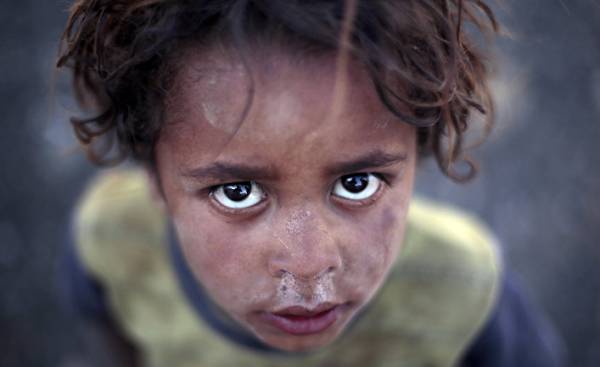 © AP Photo, Hani MohammedМальчик in a refugee camp in Yemen
© AP Photo, Hani MohammedМальчик in a refugee camp in Yemen
About the beatings, setting dogs, theft, humiliating photos that make police and border guards with migrants, telling those who tried to Wade through Bulgaria and Croatia. The scale of violence and the degrading attitude reported in the April report of the organization Oxfam. There, in particular describes the case when the Hungarian border guards forced detained persons to undress and lie down on the snow. The exception (at least for now) is Serbia, where the “top” came a clear ban on the use of violence.
However, the rights of migrants is not observed here, many people illegally returned to Bulgaria and Macedonia. In 2016, the number of cases reached several thousand. This is one reason why the people of the former warehouses are afraid to move to the official camps. However, most still have no chance to get there, as the camps are full.
In December 2016 the family of al-Rahimi from Syria who tried to get in Belgrade the status of refugees, announced that it will be taken to the camp near the Bulgarian border. Instead, people with two-year-old landed on the cold in the forest. Their saved by the bell in the “Infopark”. Refugees found thanks to the GPS and the help of the local police. Now the family is going to file a complaint with the European court of human rights.
A delicate balance
Evening meeting place in a makeshift camp is the kitchen, which gave here a group of Spaniards. It was called “No Name Kitchen”. Own efforts together with local residents volunteers have cleared one of the premises, connected the electricity, installed the stove and made the window, from which, every evening they handed out food. Working in the kitchen all together.
Twice a week the Spaniards satisfied with the meeting, which is attended by refugees and international volunteers. “Show some solidarity, and not compassion,” says one of the inscriptions on the wall. Day there are Spanish lessons for Afghans and Pashto for the Spaniards. In line for dinner, guests can work out in the dialogues. “Cómo estás? How are you?” “Za kha yam, manana. Thank you, all right.”
No Name Kitchen is like handing out Lunches Hot Food Idomeni, an informal group. She has no formal structure, no one receives a salary.
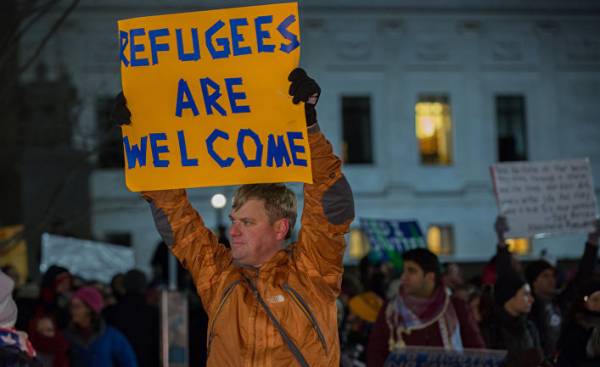 © RIA Novosti, Alexey Agaryshev | go to potbanging against the decree trump on immigrants in Washington
© RIA Novosti, Alexey Agaryshev | go to potbanging against the decree trump on immigrants in Washington
Since then, as the fall of 2016, the Serbian government has appealed to non-governmental organizations with an open letter encouraging them to stop to provide assistance to refugees outside official camps, this work continued to engage in only a few activists.
While Serbia remained a transit country, its leadership attitude towards migrants favourably. “We remember how our people suffered 20 years ago. We will do our best to make you safe here, we’re here”, — said in August 2015, the refugees, the Serbian Prime Minister Aleksandar Vucic (Aleksandar Vučić), which has now become President.
A year later, when it became clear that the migrants in Serbia is delayed, Vucic changed his tone and said that “Serbia does not want to be a “Parking lot” for Afghans and Pakistanis who had been abandoned in Europe.” Wooden box “Infopark” and the first building in which work organization “Nixalite”, was demolished. They have not ceased to assist, but try to not do it too obviously, so as not to upset the delicate balance in relations with the authorities.
Need to hurry
Meanwhile the future of a makeshift camp was called into question. The current near the embankments of the river Sava expects a large-scale reorganization, saying that the project is financed by the companies from the Gulf countries. Rumor has it that former warehouse will soon be demolished. What will happen to the thousands of people who live here? No one knows that. So with the “game” have to hurry.
“Afghan Park” loitering trio of well-dressed guys, in appearance they are not more than 14-15 years. Some time we walk along. They say that they found the “agent” and will try tomorrow to “play”. I leave them my number. Rather, for conscience ‘ sake, because I realize that me children whose fate depends on criminals.
A few days later I got the message: “Not out, but soon we’ll try again.”
